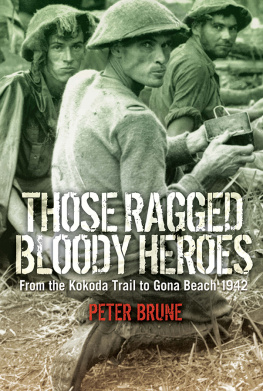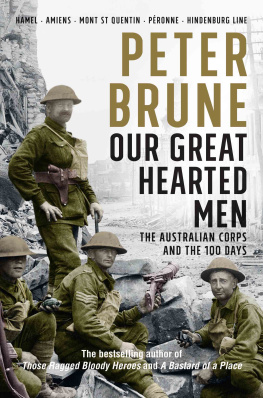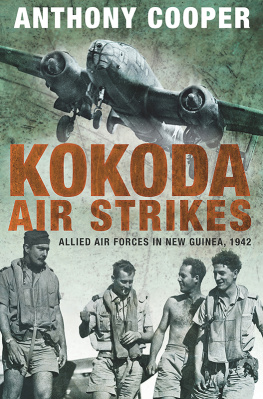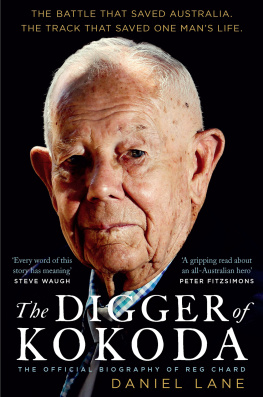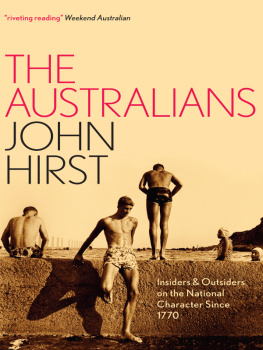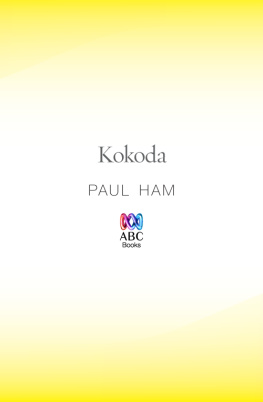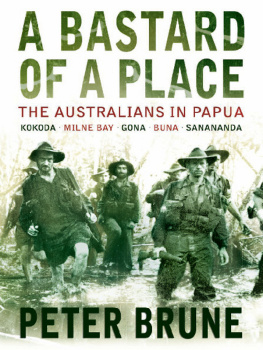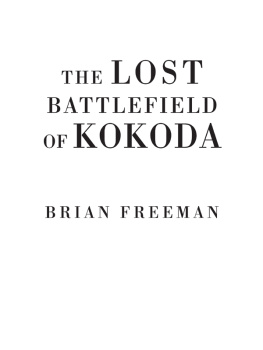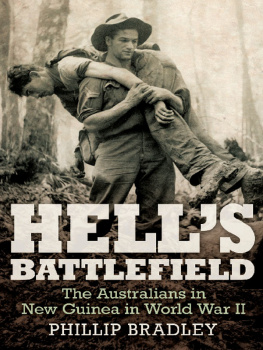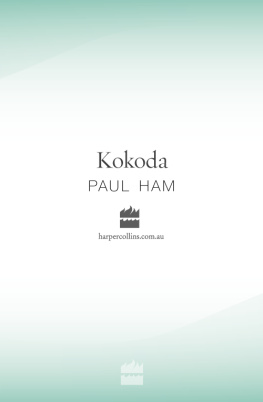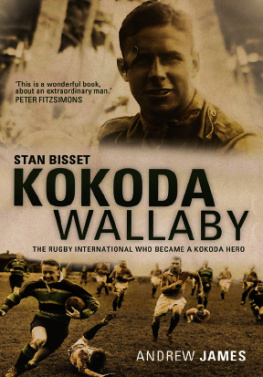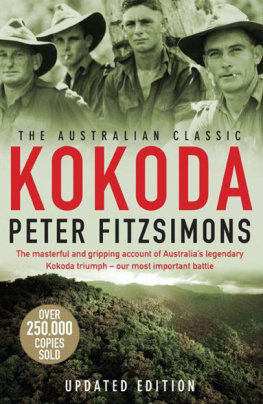
To Brigadier Arnold Potts, DSO, MC and the soldiers of Maroubra Force, who defended the Kokoda Trail and fought on to desperate victory at Gona...Those Ragged Bloody Heroes.
First published in 1991
This edition published in 2005
Copyright Peter Brune 1991, 2005
All rights reserved. No part of this book may be reproduced or transmitted in any form or by any means, electronic or mechanical, including photocopying, recording or by any information storage and retrieval system, without prior permission in writing from the publisher. The Australian Copyright Act 1968 (the Act) allows a maximum of one chapter or 10 per cent of this book, whichever is the greater, to be photocopied by any educational institution (or body that administers it) has given a remuneration notice to Copyright Agency Limited (CAL) under the Act.
Allen & Unwin
83 Alexander Street
Crows Nest NSW 2065
Australia
Phone: (61 2) 8425 0100
Fax: (61 2) 9906 2218
Email:
Web: www.allenandunwin.com
National Library of Australia
Cataloguing-in-Publication entry:
Brune, Peter. 1951- .
Those ragged bloody heroes : from the Kokoda Trail to Gona
Beach 1942.
Bibliography.
ISBN 9781741145595
eISBN 9781743436011
1.World War, 19391945 Campaigns New Guinea.
2. Kokoda Trail (Papua New Guinea). I.Title
940.5246
Set by Midland Typesetters, Victoria, Australia
Contents
Note: Owing to the age and circumstances under which some of the photos used in this volume were taken, reproduction quality may vary throughout.
Lieutenant-Colonel Ralph Honner DSO, MC, (RL), formerly commander of the 39th Battalion, Maroubra Force, Honner Force and the 2/14th Battalion.
They fought their brief day in a too-forgotten war but Peter Brunes truly historical work deepens our understanding that Those Ragged Bloody Heroes belong to all time. Over the years we have been presented with episodic reproductions of their struggles against a rapacious foe to save their grateful country from invasion. However, the dramatic figures of the protagonists have tended to obscure the background from which they emerged. How crucial was their achievement? How grateful was their country? How committed was it to repelling invasion? And how considerate was it of its young sons whom it was willing to plunge, ill-prepared and ill-supported, into the most desperate plightor, perhaps, even to abandon? Such questions are for the historian to stir and to strive to answer, shedding light amongst the shadows so that, from the illumined picture of the past, lessons and warnings for the future may be drawn. We may need to call on heroes again; we need not again leave them so ragged and so bloody.
Peter Brune has stirred the questions and striven for the answers in his challenging study of one of the most controversial phases of the war that neared our shores. Born after that war, he has the non-participants objectivity as well as the historians dedication to the discovery of truth. He has, of course, explored the archives; but he has also sought out survivors of the events he examines, recording and weighing their experiences and assessments, to build his conclusions on broader premises. In the process he has brought into fresh focus the politico-military setting of the war, he has provided a keen insight into the strategic and tactical significance of the Papuan campaigns and their critical engagements and, out of valorous defence and desperate victory, he has unrolled an enthralling chronicle. It is a story of Homeric conflict on faraway frontiersKokoda and Isurava, Abuari and Eora Creek, Mission Ridge and Brigade Hill. It does not end at Ioribaiwa in the mountains where Maroubra Force completed its Herculean task but follows its rallied remnants to tragedy and triumph at distant Gona on the shore of the Solomon Sea.
That resonant saga sounds one clarion call that rings out above all othersKokoda! With their land wide open to invasion, Australians were uplifted in spirit and fired with admiration by the tonic tidings that an isolated band of their young fellow-countrymen had faced overwhelming odds at far Kokoda and had acquitted themselves with honour; and the kindling spark of Kokoda, flaming to a fiercer conflagration, was to blaze into a symbol of national pride.
The fate of the nation did not hang on the outcome of two forlorn forays at Kokoda, audacious and courageous though they were. In each of them only a few score of our troops confronted a tenfold enemywith no realistic hope of holding on to the vital airstrip. That strategic prize had already been conceded by the lack of planning to protect it; and no tardy token resistance could reverse the foregone consequence of that neglect.
But Kokoda came to signify much more than an outpost and its airstrip. The Kokoda track, up from the northern beaches and over the Owen Stanley Range, was chosen by the Japanese South Seas Force for its push to Port Moresby, the final stepping-stone for the invasion of Australia. That primitive path was to become a soldiers Calvary; and, along its grim Golgotha, the decisive action was not some valiant, fruitless venture at Kokoda but the grinding four-day Battle of Isurava. If Isuravas defenders had wavered in the face of the first onslaughts, or had fought less tigerishly through the succeeding days and nights, the ensuing course of the campaign must inevitably have been radically changed.
Attacking in unending waves, crashing with the thunder of their overpowering fire, the massed invaders eventually won that violent encounter; but in their costly victory were sown the seeds of their defeat. Their greatly superior force was grievously depleted by mounting casualties and increasingly eroded by four extra days exposure to the supply shortfalls and the health hazards of the hostile mountains; and they had failed to cut off the withdrawal of their reduced but resolute foe, their desperately delaying foe, exhausted, emaciated, decimated but undaunted, pugnaciously mauling every assault and savaging every encirclement, and tenaciously contesting command of the track, creek by creek and ridge by ridge, all the way back to Ioribaiwa. The all-conquering samurai spirit was broken by that indomitable defiance; and the once-proud South Seas Force turned away, bowed and beaten.
Kokodas auroral glory glows from the brave battalions that sustained the shock of battle along all the Kokoda track, to be shattered and dismembered and disintegrated in the cruel mountains, the strangling jungles and the fetid swamps, never vanquished and, in the end, triumphant, but at a mortal costthe life-blood of their loved brothers, poured out across those fearful killing-fields. That glory is not of the exultation of war but of the exaltation of man, the nobility of man sublimated in the fiery crucible of war, shining faithfulness and fortitude and gentleness and compassion elevated from all dross.
Hence, a deeper theme of the epic of Kokoda is surely the noble conduct, the towering stature of the selfless, courageous young warriors who created it. How do we now see them? One author has dubbed them Knights of Kokoda. Ragged bloody heroes might have seemed incongruous in Camelot; and they sought no mystic Holy Grail. Yet they may, themselves, sense some transcendent aura attending the later legend of the Kokoda Trail, burgeoning from the mud and blood of the Kokoda track they knew and flourishing from unforgetting hearts and hands and voices:
Time and rain and the jungle will obliterate this little native pad; but for evermore will live the memory of weary men who have passed this way, ghosts of glorious men that have gone, gone far beyond the Kokoda Trail.
Next page
